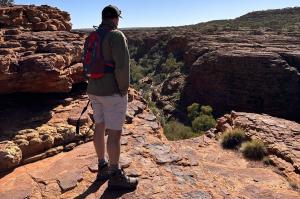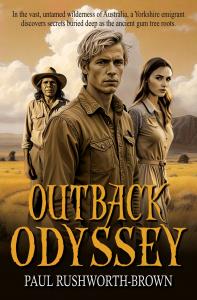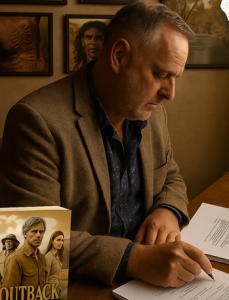Truth, Trauma, and Healing in the Outback: A Novel That Echoes Across Reconciliation Week

Gazing across Country—Outback Odyssey explores healing, heritage, and the journey toward reconciliation in the heart of Australia.
Outback Odyssey is a historical fiction adventure romance—but beneath the surface, it’s an allegory of healing, truth, and cultural reconnection.
SYDNEY, NSW, AUSTRALIA, May 27, 2025 /EINPresswire.com/ --
As Australia commemorates National Sorry Day, reflecting on the historical and ongoing trauma of the Stolen Generations, Paul Rushworth-Brown’s latest historical novel, "Outback Odyssey", offers a stirring exploration of grief, survival, and the quiet strength found in truth-telling. Set against the backdrop of 1950s Australia, the novel arrives at a time when the nation continues to grapple with the legacy of forced removals, mental health neglect, and the need for meaningful reconciliation.
National Sorry Day, observed annually on May 26, marks the anniversary of the Bringing Them Home report (1997), which detailed the harrowing experiences of Aboriginal and Torres Strait Islander children removed from their families. Among its 54 recommendations was the creation of a national compensation scheme for survivors—yet, 28 years later, Queensland and Western Australia, where many survivors reside, have yet to implement such a scheme.
Amid these delays, "Outback Odyssey" serves as a poignant fictional reflection of real-life intergenerational pain. It follows Jimmy, a post-war English migrant haunted by trauma, who ventures into the unforgiving Australian outback and is taken under the wing of Jarrah, a First Nations Elder. Their unlikely bond unveils not only cultural wisdom and connection to the Country but also the emotional toll of a society that fails to acknowledge its wounds.
Outback Odyssey functions on both a literal and allegorical level—Jimmy’s physical journey through the Australian outback mirrors a deeper, spiritual trek through grief, dislocation, and ultimately, reconciliation. His encounters with Jarrah are not just narrative moments but symbolic bridges between colonial ignorance and Indigenous wisdom. Through storytelling, observation of Country, and ceremonial guidance, Jarrah imparts a worldview shaped by tens of thousands of years of connection to land, community, and healing. In this way, the novel becomes a quiet allegory for Australia itself—a nation in search of identity, burdened by its history, yet offered a path forward through listening to First Nations voices.
“There’s a quiet mental health crisis in rural and remote communities—particularly among men, particularly among those whose pasts have never been heard,” said author Paul Rushworth-Brown. Outback Odyssey is about finding language for the unspeakable, and honouring stories that were never given space.”
As Australia enters National Reconciliation Week (May 27 – June 3), "Outback Odyssey" deepens the national conversation. This year, Reconciliation Day falls on June 2, marking the anniversary of the 1967 Referendum, when more than 90% of Australians voted to amend the Constitution to include Aboriginal people in the census and allow the federal government to legislate for them. While symbolic, the vote was only the beginning—true reconciliation remains a journey.
“We’ve had too many survivors pass away before they see justice,” said Healing Foundation CEO Shannan Dodson, calling for urgent action. “Mental health isn’t separate from justice—it’s part of it.”
Through the lens of historical fiction, "Outback Odyssey" bridges the silence between policy and lived experience. It sheds light on cultural loss, mental health stigma, and the enduring need for healing, both personal and national.
About the Author:
Paul Rushworth-Brown is the award-nominated author of Skulduggery, Red Winter Journey, and Dream of Courage: Facing Fear Head On. His stories explore history’s overlooked voices and emotional undercurrents, with a commitment to cultural authenticity. He is also the host of the History Bards & Down Under Interviews podcast.
Contact
For interviews, review copies, or more information, contact:
Hayley Brown, Publicist
The Rip Buddy Revolutionizes Card Protection at The National Sports Collectors Convention With Official Product Launch
Achievement Balance Launches 'Little Sprouts' - A Therapeutic Early Learning Program at Flower Mound Location
Six Solo Exhibitions Artists' Talk Sunday, August 17
Więcej ważnych informacji
 Jedynka Newserii
Jedynka Newserii

 Jedynka Newserii
Jedynka Newserii

Ochrona środowiska

A. Bryłka (Konfederacja): Ograniczenie emisyjności nie musi się odbywać za pomocą celów klimatycznych. Są absurdalne, nierealne i niszczące europejską gospodarkę
W lipcu br. Komisja Europejska ogłosiła propozycję nowego celu klimatycznego, który zakłada ograniczenie emisji gazów cieplarnianych o 90 proc. do 2040 roku w porównaniu do stanu z 1990 roku. Został on zaproponowany bez zgody państw członkowskich, w przeciwieństwie do poprzednich celów na 2030 i 2050 rok. Polscy europarlamentarzyści uważają ochronę środowiska i zmiany w jej zakresie za potrzebne, jednak nie powinny się odbywać za pomocą nieosiągalnych celów klimatycznych.
Polityka
Dramatyczna sytuacja ludności w Strefie Gazy. Pilnie potrzebna dobrze zorganizowana pomoc humanitarna

Według danych organizacji Nutrition Cluster w Strefie Gazy w lipcu br. u prawie 12 tys. dzieci poniżej piątego roku życia stwierdzono ostre niedożywienie. To najwyższa miesięczna liczba odnotowana do tej pory. Mimo zniesienia całkowitej blokady Strefy Gazy sytuacja w dalszym ciągu jest dramatyczna, a z każdym dniem się pogarsza. Przedstawiciele Polskiej Akcji Humanitarnej uważają, że potrzebna jest natychmiastowa pomoc, która musi być dostosowana do aktualnych potrzeb poszkodowanych i wsparta przez stronę izraelską.
Polityka
Wśród Polaków rośnie zainteresowanie produktami emerytalnymi. Coraz chętniej wpłacają oszczędności na konta IKE i IKZE

Wzrosła liczba osób, które oszczędzają na cele emerytalne, jak również wartość zgromadzonych środków. Liczba uczestników systemu emerytalnego wyniosła w 2024 roku ponad 20,8 mln osób, a wartość aktywów – 307,5 mld zł – wynika z najnowszych danych Urzędu Komisji Nadzoru Finansowego (UKNF). Wyraźny wzrost odnotowano w przypadku rachunków IKE i IKZE, na których korzyść działają m.in. zachęty podatkowe. Wpłacane na nie oszczędności są inwestowane, a tym samym wspierają gospodarkę i mogą przynosić atrakcyjną stopę zwrotu.
Partner serwisu
Szkolenia

Akademia Newserii
Akademia Newserii to projekt, w ramach którego najlepsi polscy dziennikarze biznesowi, giełdowi oraz lifestylowi, a także szkoleniowcy z wieloletnim doświadczeniem dzielą się swoją wiedzą nt. pracy z mediami.









.gif)

 |
| |
| |
|